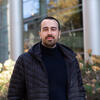This interview has been edited for length and clarity.
Why did you choose to attend graduate school at Temple?
By the end of my junior year at the University of Kragujevac, I had become interested in machine learning. I first took an online course taught by Andrew Ng, who is one of the top minds in the field, and it opened my eyes to all of the things that we can do with this technology. I wanted to learn more, so I talked with my professors at the University of Kragujevac, who put me in contact with my current advisor at Temple, Dr. Zoran Obradovic. If you go back to my hometown and talk with my friends and family, they’ll tell you that I’m not someone who’s often doing unpredictable things, so this was the biggest move in my life.
How would you describe the work you do at Temple? What kind of research/projects have you been a part of?
So far, I have one publication, a machine learning approach that I developed which aims to predict cancer in patients based on their previous doctor’s visits. By looking at 51,000 different patients across 10 different hospitals in a nine-year period, we gathered around 7,000 diagnoses that doctors had noted during their visits. By using all that information, we were able to predict the four most common types of cancer with an accuracy between 78-88%. This publication has been recently linked to the United Nations Sustainable Development Goals; I do think we play a role in achieving a sustainable and equitable future. I worked on that project with my colleague Branimir Ljubic, who is a medical expert, currently working at Rutgers as a Senior Scientist and the second author in the publication. Now, I am trying to learn about mass shootings; in the year of 2023, in Serbia for the first time in our history, there were two awful massacres, one of which happened in a school, and it has become an important issue to me. For the past year and a half, I have been collaborating with some professors from Klein College of Media and Communications at Temple as we work to apply machine learning to mass shooting data and statistics.
How do you find community at Temple and in Philadelphia?
In these four years I have learned so much outside my studies too, just by traveling and meeting new people from different cultures. That’s one thing I love about Philly, it’s really international. You get in touch with many diverse cultures and religions, and I think that type of interaction is one of the most important parts of my time at Temple. Outside the lab, I like to watch soccer and basketball. My favorite team is my hometown team, Radnički Kragujevac, but I have enjoyed attending some Temple college basketball and Sixers games in Philly as well.


